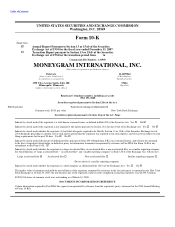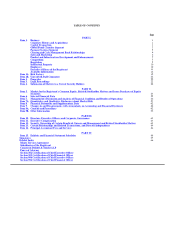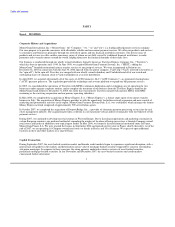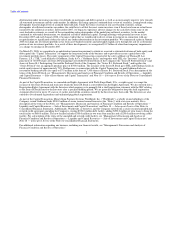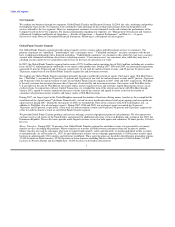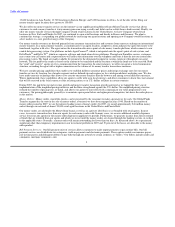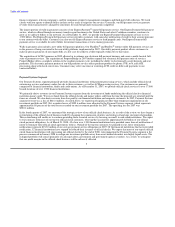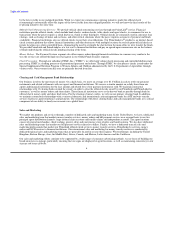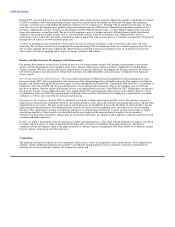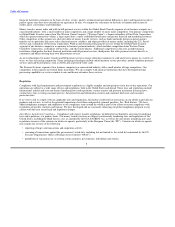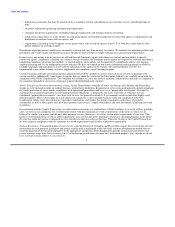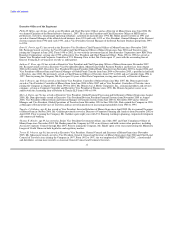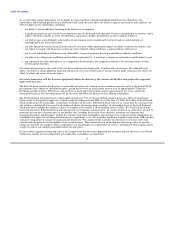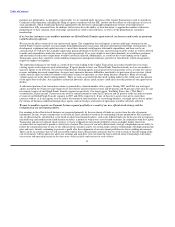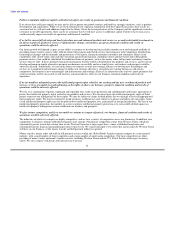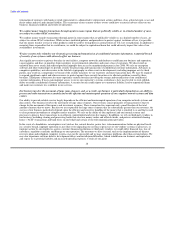MoneyGram 2007 Annual Report Download - page 12
Download and view the complete annual report
Please find page 12 of the 2007 MoneyGram annual report below. You can navigate through the pages in the report by either clicking on the pages listed below, or by using the keyword search tool below to find specific information within the annual report.
Table of Contents
• limitations on amounts that may be transferred by a consumer or from a jurisdiction at any one time, or over specified periods of
time;
• consumer information gathering and reporting requirements;
• consumer disclosure requirements, including language requirements and foreign currency restrictions;
• notification requirements as to the identity of contracting agents, governmental approval of contracting agents or requirements and
limitations on contract terms with our agents; and
• registration or licensing of the Company or our agents with a state or federal agency in the U.S. or with the central bank or other
proper authority in a foreign country.
Regulations impacting money transfers are constantly evolving and vary from country to country. We continue to implement policies and
procedures and work to make our business practices flexible in order to help us comply with the most current legal requirements.
In most cases, our money transfer services are offered through third party agents with whom we contract and our ability to directly
control our agents' compliance is limited. As a money services business, the Company and its agents are required to establish anti-money
laundering compliance programs that include: (i) internal policies and controls; (ii) designation of a compliance officer; (iii) ongoing
employee training and (iv) an independent review function. We have developed an anti-money laundering training manual available in
multiple languages and a program to assist with the education of our agents on the various rules and regulations. In 2007, we
implemented a new online training system to supplement our compliance agent training program.
Certain economic and trade sanctions programs administered by OFAC prohibit or restrict transactions to or from, or dealings with,
certain countries. Additionally, transactions in regions that are under the control of the Palestinian Authority are carefully monitored for
compliance with OFAC requirements. The Company will continue to assess the relative regulatory requirements and risks as compared to
the consumer demand for services in certain government identified high-risk countries.
Money Transfer and Payment Instrument Licensing. In the United States, virtually all states, the District of Columbia and Puerto Rico
require us to be licensed in order to conduct business within their jurisdiction. Requirements to be so licensed generally include minimum
net worth, provision of surety bonds, compliance with operational procedures and reserves or "permissible investments" that must be
maintained in an amount equivalent to outstanding payment obligations, as defined by the states. The types of securities that are
considered "permissible investments" vary from state to state, but generally include U.S. government securities and other highly rated
debt instruments. Most states require us to file reports on a quarterly or more frequent basis to verify our compliance with their
requirements. Many states also subject us to periodic examinations and require that money transmitters and issuers of payment
instruments, as well as their agents that offer these products and services, comply with federal and state anti-money laundering laws and
regulations.
In connection with the Capital Transaction, we sold certain investments at a realized loss of $260.6 million. As a result of these portfolio
sales, we were not in compliance for a brief period of time with the minimum net worth requirements of the states in which we are
licensed to conduct our money transfer and other payment services businesses, as well as certain other requirements of one state. This
failure to meet minimum net worth or other requirements may result in the states imposing certain fines and other penalties in the future.
No state has taken any action or informed us of its intention to take any action at this time. Upon the closing of the Capital Transaction,
we were again in compliance with the minimum net worth requirements and all other regulatory requirements.
Escheat Regulation. Unclaimed property laws of every state, the District of Columbia and Puerto Rico require that we track the relevant
information on each payment instrument and money transfer and, if unclaimed at the end of the statutory abandonment period, that we
remit the proceeds of the unclaimed property to the appropriate jurisdiction. State abandonment periods for payment instruments and
money transfers range from three to seven years. Certain foreign jurisdictions also may have unclaimed property laws, though we do not
have material amounts subject to any such law.
9


